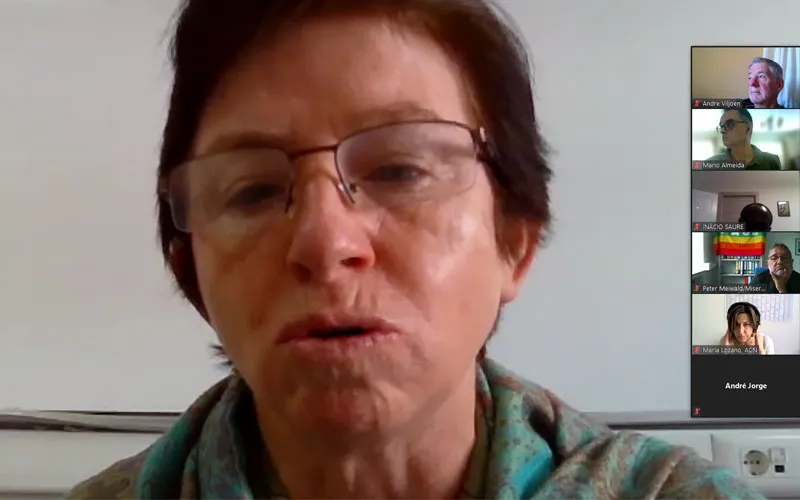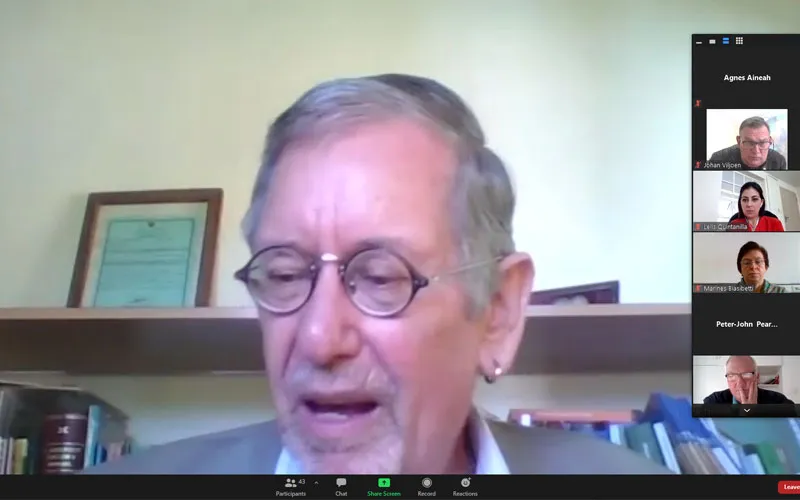Speaking during the July 27 virtual event, Mr. Weimar urged the Mozambican government and those working towards peace in the Southern African country to investigate the feasibility of what he referred to as the “Triple Nexus Approach”, which he said would focus on the humanitarian, development, and peace building in the country.
The researcher and independent journalist called on the parties in conflict to address issues of livelihoods, adequate living conditions and erosion of social cohesion with the goal to restore stability in Cabo Delgado.
In her presentation at the July 27 webinar, the Director of Mozambican Episcopal Conference Commission for Migrants, Refugees and Displaced Persons (CEMIRDE), Sr. Marines Biasibetti, reiterated Mr. Weimer’s observation that the people’s grievances in a province that is endowed with wealth are fueling the ongoing violence.
“Cabo Delgado is the richest province in Mozambique with a lot of minerals yet it is the most underdeveloped with people lacking basic means to survive. With this situation at hand, the insurgents are getting sympathy from locals who need change in the way things are run,” Sr. Marines said.
Presenters at the DHPI event also provided an update of the situation in Cabo Delgado, saying that approximately 900,000 people have been displaced within the Mozambican Province and in the surrounding Provinces such as Niassa, Zambézia and Nampula.
(Story continues below)
It was noted that 50 percent of the displaced people are children.
“Every day there are new attacks with localized outbreaks, forcing people to abandon everything to seek refuge elsewhere,” Sr. Marines said, and added that the most affected districts are Palma, Mocímboa da Praia, Quissanga, Macomia and Muedumbe, among others.
The Catholic Nun noted that displaced people are concentrated in 10 districts of the Province, with emphasis on Meconta with 3,890 people, where the transitory center is located; city of Nampula with 19,478 people; Corane administrative post where 900 families were resettled, totaling 4,500 people.
She said, in reference to the IDPs, “Many are unable to cultivate their land for lack of agricultural inputs and tools, added to the scarcity of basic services and decent housing.”
About 20,000 IDPs have found refuge in the Catholic Diocese of Nacala within the Province of Nampula, the Catholic Nun said.
Zambezi Province has four resettlement centers holding a total of 1,330 families. About 800,000 victims of violence, however, are staying in the volatile Province of Cabo Delgado, which holds a majority of those displaced in the violence.
Another transit center is in the District of Sanga at Mozambique’s border with Tanzania, which holds approximately 250 families.
The Catholic Nun, however, describes what she refers to as “a clear violation of human rights and international agreements” following denial of entry of Mozambican IDPs in Tanzania.
She says that most families that tried to settle in Tanzania were forcibly sent back to districts in Cabo Delgado, Nampula and Niassa where they are not safe.
“Due to violent attacks, and in particular the last one in the village of Palma, more than 10,000 Mozambicans took refuge in the neighboring country of Tanzania, however authorities refused to take (them) in and give asylum. So many are forcibly returned from Tanzania through the Negomano border post,” Sr. Marines said July 27.
The official who deals with Mozambique’s Migrants, Refugees and Displaced Persons told participants in the virtual event that the city of Nampula also functions as a transit center, where many IDPs are welcomed by family members, and those who wish are referred to another center where they receive some assistance.
Archbishop Inácio Saure of the Catholic Archdiocese of Nampula acknowledged the kindness displayed by families that have been welcoming to those displaced in Cabo Delgado.
“I have been touched by the generosity of people in Nampula. I have seen poor families, people who have very little opening their doors to strangers escaping violence in Cabo Delgado. Today, it is common to find more than 30 people living in one homestead,” Archbishop Inácio said at the DHPI event.
The Mozambican Archbishop narrated the horrors experienced by the IDPs who are walking around with the memories of the beheadings and killings of their kinspersons.
“The IDPs have been hurt immensely in life. They have had their dignity stripped off and for some of them, it has been difficult to walk with their heads raised,” the member of Consolata Missionaries said.
In some places, IDPs are treated with suspicion by locals who see them as members of militants from Cabo Delgado, the Archbishop observes.
He says that the biggest desire for the displaced people is to go back home to rebuild their homes.
This is the same message that Tim Smith, the JRS Regional Director said he had observed among IDPs in Mozambique.
“We have spoken to many IDPs and one thing stands out from what they say; most of them want to go back home. But they also want to go back to a stable province that is free from terrorist attacks,” Mr. Smith said at the event that was organized by the peace entity of the Southern African Catholic Bishops’ Conference (SACBC).
He narrated that refugees in various camps where they are seeking refuge are undergoing a myriad of challenges, key among them lack food, water and basic services.
“There is competition for water among locals and hundreds of thousands of children are not going to school. UNICEF started building schools and there is food distribution once in a while but we don’t know how sustainable this is,” the JRS official said.
DHPI’s Lelis Quintanilla reported that there are only four water pumps serving over 4,000 IDPs at Corane.
Additionally, only one teacher is available for over 600 school going children in the camp who attend schools that have no stationery.
“IDPs undergo many unimaginable challenges,” Lelis says, and adds, “While the rest of the world is concerned about the COVID-19 pandemic, there is no talk of such nature in the camps. The people have bigger concerns here.”

DHPI is working with the Catholic Archdiocese of Nampula to provide emergency assistance to refugees who keep coming to Corane in large numbers.
Lelis says that families arriving are given food supplies and temporary shelter. While some displaced people remain on transit, there are those who stay longer in the temporary shelters. After six months, the charity and peace organization enlists the IPDS for more permanent shelters and gives them agricultural inputs to become more self-reliant.
Agnes Aineah is a Kenyan journalist with a background in digital and newspaper reporting. She holds a Master of Arts in Digital Journalism from the Aga Khan University, Graduate School of Media and Communications and a Bachelor's Degree in Linguistics, Media and Communications from Kenya's Moi University. Agnes currently serves as a journalist for ACI Africa.










